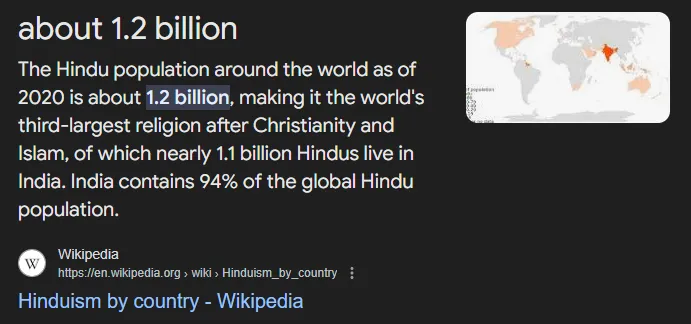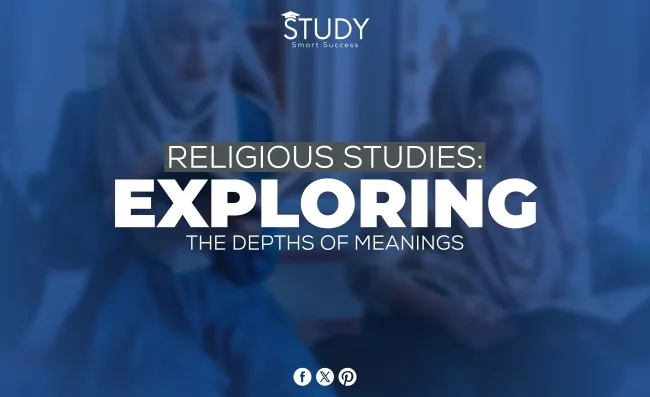Introduction
Definition of Religious Studies
Religious studies is interdisciplinary and examines religious beliefs, practices, and cultures. It examines religious occurrences historically, philosophically, sociologically, and anthropologically. Religious studies examine how people express spirituality and engage with the sacred through religious traditions and their effects on individuals and societies. Read further about a religious studies degree.
Importance and relevance in contemporary society
In today’s globally linked world, religious studies help people from different cultures talk to each other. When people of different religions come together because of globalization, religious studies shed light on the beliefs and behaviors that make up people’s worldviews. In this time of religious diversity, religious studies teach people to be tolerant, respectful, and aware of cultural differences.
This field prepares students for multicultural society by studying religion’s past and present. Religious studies gives significant perspectives on today’s urgent concerns, whether studying religion in politics, ethics, or social justice movements.
The Origin and Evolution of Religious Studies
Historical background
Religious studies originated in ancient civilizations, where religion was central to society. In the 19th century, during the Enlightenment, religious studies became a formal academic discipline. Critical and scientific methods explored religion, challenging established beliefs and interpretations.
Pioneers and key figures in the field
Several personalities shaped religious studies. Max Müller, a German philologist, pioneered religion comparative research, identifying common themes and patterns. French sociologist Émile Durkheim examined religion’s influence on social cohesiveness and solidarity. Psychoanalysis founder Sigmund Freud explained religious beliefs and rituals psychologically.
Development of methodologies and approaches
Religious studies now encompasses many methods and approaches. In historical-critical methods, religious texts and traditions are examined in their historical contexts. Anthropological approaches focus on the cultural aspects of religion and ritual practice. Sociological perspectives examine how faith shapes social structures and institutions. Multidisciplinary approaches have arisen, including psychology, neurology, and gender studies, to comprehend religious occurrences better.
Major Religions of the World
Brief overview of major world religions (Christianity, Islam, Hinduism, Buddhism, Judaism)
The world’s major religions encompass a rich tapestry of beliefs, practices, and cultural traditions.
- Christianity: Christ’s teachings underpin Christianity, the world’s largest religion, with nearly 2.4 billion followers. It has Catholic, Protestant, and Eastern Orthodox branches.

- Islam follows Muhammad’s teachings, and it was founded on the Arabian Peninsula in the 7th century. Islam’s Five Pillars and monotheism attract almost 1.9 billion followers.

- Hinduism: Hinduism is one of the oldest religions originating in India. Karma, dharma, moksha, and deity worship are among its many beliefs and practices. According to Google Wikipedia, there are 1.2 billion followers of Hinduism.

- Buddha founded Buddhism, emphasizing the Four Noble Truths and the Eightfold Path to Enlightenment. Buddhism has about 500 million followers in Asia.

- Jewishness: Judaism, founded in ancient Israel, is monotheistic and based on the covenant between God and the Jews. Torah, Jewish law, and religious holidays are influential.

Core beliefs and practices
Following these religions means following a particular set of ideas and rules daily. Some examples are faith in a god or gods, morals, traditions, prayers, and holy books.
Cultural and geographical contexts
Their cultural and geographical surroundings shaped these religions’ formation and spread. Religious traditions have been shaped by numerous cultures and surroundings, from the Middle East deserts to India’s river valleys and Tibet’s Himalayas. In a worldwide society, these religions thrive and adapt to new cultural situations while keeping their rich legacy and traditions.
Comparative Religious Studies
Understanding similarities and differences among religions
Comparative religious studies examine religious traditions’ similarities and differences. Scholars learn about human spirituality, religious belief, and practice by investigating shared themes, symbols, motifs, and differing theological beliefs and practices.
Comparative analysis of religious texts, rituals, and traditions
Comparative religious studies examine texts, rituals, and traditions from other faiths. Researchers study how sacred writings, including the Bible, Quran, Vedas, Tripitaka, and Torah, impact religious groups’ beliefs and practices. They also research prayer, meditation, pilgrimage, and sacrifice to find meaning.
Impact of globalization on religious interactions
Globalization has enabled unprecedented religious crossover, resulting in collaboration and conflict. Comparative religious studies analyze how globalization has affected religious connections, including the expansion of spiritual ideas and practices, new religious movements, and interfaith dialogue projects.
Religious fanaticism, extremism, and intolerance in an increasingly interconnected globe and the potential for religious variety to create mutual understanding and cooperation across cultural and national boundaries are also examined.
Contemporary Issues in Religious Studies
Intersectionality and religion
Intersectionality, a feminist notion, is growing in religion studies. It studies how race, gender, sexuality, and socioeconomic status affect religious beliefs and practices. Scholars study how overlapping identities affect religion and how religious institutions and texts promote or challenge injustice and privilege.
Religion and politics
The complex and controversial relationship between religion and politics shapes global events. Religious studies experts examine how religious beliefs and institutions influence governance, legislation, and social movements through political ideologies and power structures. They also discuss religion’s influence on public discourse, electoral politics, foreign affairs and the conflicts between religious freedom and secular governance.
Role of technology in religious studies
Technology has transformed religion research, education, and outreach. Religious studies experts use Internet databases, digital archives, and virtual reality to study spiritual texts, artefacts, and historical records.
They also examine how digital media and social media affect religious communities, practices, and beliefs and the ethical implications of digital monitoring, censorship, and privacy in religion.
Careers in Religious Studies
Academic pathways
Academic life can be rewarding for religious studies enthusiasts. A university or college professor or researcher can teach religious studies, conduct research, and write scholarly articles and books. Master’s or Ph.D. degrees in religious studies or a related topic are expected, with specializations in theology, comparative religion, or religious anthropology.
Non-academic career opportunities
Beyond academia, religious studies graduates have many valuable talents and knowledge in numerous industries. Interfaith groups, religious nonprofits, and humanitarian agencies offer community outreach, social services, and advocacy jobs. Journalism, publishing, museum curation, spiritual counselling, and government posts in diplomacy, cultural affairs, and foreign development are more options.
Skills and qualifications required
Critical thinking, research, and communication are essential for religious studies. They should understand complex texts and concepts, communicate respectfully with diverse people, and write and speak fluently.
Cross-cultural competency, empathy, and interfaith literacy aid religious diversity and community harmony. Some academic or specialized positions require further degrees, but practical experience, internships, and networking can promote religious studies careers.
Controversies and Debates in Religious Studies
Ethics in religious research
Religious studies must prioritize ethics, especially when studying humans or sacred texts. Scholars must consider informed consent, confidentiality, and cultural sensitivity when studying religion. To undertake ethical research, cultural appropriation, power dynamics, and harm must be addressed.
Secularism vs. religious perspectives
The conflict between secularism and religion is significant in religious studies and society. Researchers study how secular ideologies and institutions affect religious beliefs and behaviors, including church-state separation, religious freedom, and secularism’s impact on public policy and education. Debates over religion in the public realm, including evolution, abortion, and LGBTQ rights, reflect broader disagreements about religion and government in many civilizations.
Challenges of studying sensitive topics
In religious studies, sensitive themes can offend or alienate religious communities and cause controversy or backlash. Exploring controversial topics like religious extremism, violence, and sexual assault in religious institutions may be blocked.
Religious ideas and practices must be interpreted and represented with cultural and historical awareness to minimize misrepresentation and misunderstanding. Religion studies must address contentious themes to advance knowledge and create critical discourse despite these limitations.
Future Directions of Religious Studies
Emerging trends and research areas
Religious studies may study new frontiers and trends as the world evolves. Future research may examine religion and technology, how climate change affects religious beliefs and practices, and how religion may address global issues like poverty, inequality, and violence.
Scholars can also study understudied religious traditions, marginalized populations, and alternative spiritual movements to understand religious diversity better worldwide.
Impact of globalization and multiculturalism
Globalization and multiculturalism are changing religion studies, offering opportunities and problems. Scholars will study how globalization and cultural interchange affect religious beliefs, identities, and behaviors.
The expanding diversity of religious communities in multicultural nations will motivate researchers to study religious pluralism, interfaith interaction, and religious identity negotiation.
Potential challenges and opportunities
The future of religious education is bright, but it also has risks. Scholars may need help to do objective research due to finance, political censorship, and ideological divisiveness. The ethical challenges of studying religion in a globalized environment will necessitate continual contemplation and discourse in the discipline.
Despite these limitations, creativity, collaboration, and interdisciplinary interaction can improve our understanding of religious occurrences and advance knowledge and mutual understanding in a changing world.
Resources and Further Reading
Books, journals, and websites for deeper exploration
Books:
- “The Sacred and the Profane” by Mircea Eliade
- “A History of God” by Karen Armstrong
- “The Varieties of Religious Experience” by William James
- “The Interpretation of Cultures” by Clifford Geertz
- “The Oxford Handbook of Religious Diversity“, edited by Chad Meister and Jamie Smith
Journals:
- Journal of the American Academy of Religion
- Religious Studies Review
- Journal for the Scientific Study of Religion
- Numen: International Review for the History of Religions
- Journal of Religion and Society
Websites:
- Harvard Divinity School’s Religious Literacy Project
- The Pluralism Project at Harvard University
- Pew Research Center’s Religion & Public Life
- Religious Studies Project
- American Academy of Religion’s Religion Dispatches
Online courses and educational platforms
Coursera:
- “Religious Literacy: Traditions and Scriptures” by Harvard University
- “Introduction to the Study of Religion” by the University of California, Santa Barbara
- “Buddhism and Modern Psychology” by Princeton University
- “Islam Through Its Scriptures” by Harvard University
EdX:
- “World Religions through Their Scriptures” by Harvard University
- “Religious Literacy: Traditions and Scriptures” by Harvard University
- “Religion and Conflict Transformation” by Emory University
- “Buddhism and Modern Psychology” by University of Queensland (Not available)
Khan Academy:
- “Introduction to World Religions“
- “Comparative Religions” Go to the website and search it further.
Professional organizations and conferences
Annual Meeting: The largest gathering of scholars in religious studies, featuring panels, workshops, and presentations on various topics.
Annual Meeting: A premier event for scholars of biblical studies and related fields, offering opportunities for networking, collaboration, and professional development.
World Congress: A global conference bringing together scholars from diverse disciplines to exchange ideas and research findings in the study of religion.
Annual Conference: A forum for scholars of religion in Europe to discuss current research, methodologies, and theoretical approaches in the field.
Annual Meeting: A gathering of scholars focused on critical and interdisciplinary approaches to studying religion, fostering dialogue and debate on pressing issues.
Conclusion
This investigation of religious studies has covered its history and relevance. We’ve investigated significant world religions, comparative techniques, and contemporary situations to illustrate scholars’ ethical considerations, obstacles, and opportunities in studying religion.
We conclude that religious education illuminates our world’s beliefs, practices, and cultural circumstances. Read more, take online courses, and join professional groups to study religious studies. Understanding religion can promote tolerance, empathy, and discourse in a diverse and linked world.
Religion studies promote understanding, respect, and collaboration across cultural and religious boundaries in our complex and ever-changing world. Religious education enhances our understanding of human nature and forces us to consider religious variety’s ethical, social, and political implications. Religious studies may help us understand the difficulties of global civilization and create a more just, compassionate, and peaceful world.


